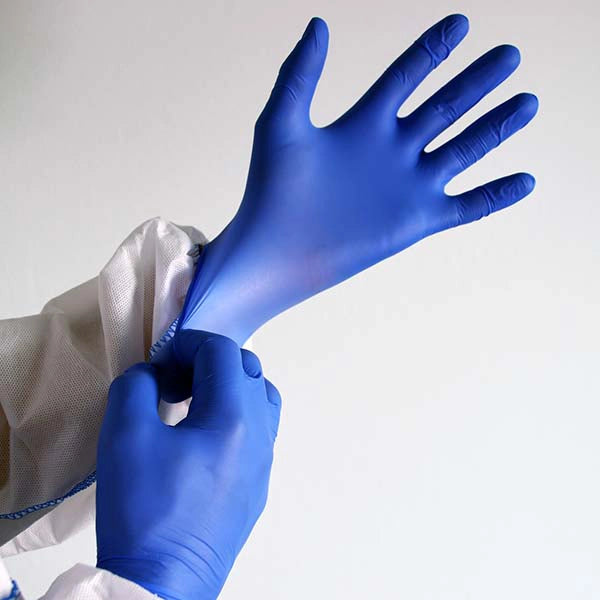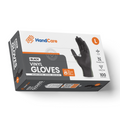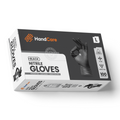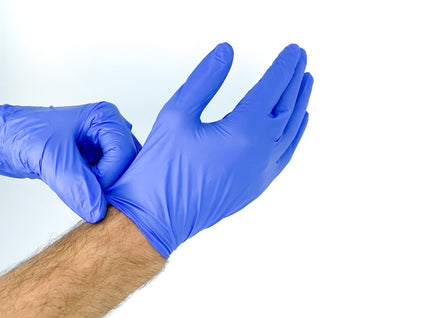One of the biggest parts of child and senior care is changing a soiled diaper. You need to clean and replace them with a clean diaper to ensure they are comfortable and happy. However, this is a challenging task, especially if the child or senior is uncooperative or unable to cooperate.
Diaper changing can get messy.
This is why wearing diaper-changing gloves is important. With the best gloves for changing diapers, you can protect yourself and decrease the mess. Here is everything you need to know about diaper-changing gloves!
What Are Diaper Changing Gloves?
Not all people are fine with seeing, smelling, and handling poop. This might be too much for some, especially the handling part.
Added protection like diaper-changing gloves can help.
Disposable gloves for changing diapers will protect your hands from getting into direct contact with the poop. It will also aid in managing and keeping your changing pad or room clean and tidy.
They are also called incontinence gloves.
Should You Wear Gloves When Changing A Diaper?
Yes! All senior and childcare workers must wear medical-grade disposable gloves to prevent contamination and the spreading of bacteria, viruses, germs, etc. Recently, wearing a pair of gloves for changing diapers has been advised to ensure safety.
This is because numerous diseases and infections can be transmitted through poop or fecal matter. Here are a few:
- Adenovirus
- Campylobacter
- Cryptosporidiosis
- Coxsackievirus, or the hand-foot-mouth disease
- Enteroviruses
- E. Coli
- Hepatitis A
- Giardia
- Rotavirus
- Pinworms
- Polio
- Shigella
- Salmonella
- Tapeworms
You must wash your hands with soap thoroughly to avoid getting or spread of illness, infection, or disease through the fecal-oral route.
To prevent any transmission or contamination, wearing a pair of gloves when changing diapers is crucial. You can wear them before changing the diapers, wipe them clean with disposable wipes, and throw them away after.
This will protect you, your child, and/or your client while ensuring no fecal matter, bodily waste, or bodily fluids are stuck under your nails. You can also prevent the spreading of infections and diseases to your other children or clients. Also, it will keep your hands clean, dry, and free from bacteria, viruses, and germs.
After throwing the diaper-changing gloves, wash your hands thoroughly and apply alcohol. There is nothing wrong with being extra cautious!
3 Best Gloves For Changing Diapers
There are many advantages of using poop gloves when changing the diapers of children and adults. However, just like in any product, not all diaper-changing gloves are made the same. Some diaper-changing gloves might suit your preferences and needs.
Also, you need to consider the materials used in the poop gloves. Some children and people can be sensitive to certain materials, such as latex. You need to be careful about which diaper-changing gloves you use.
Here are the 3 best type of gloves as poop gloves you can choose from!
1. Latex Gloves
Contrary to popular knowledge, latex gloves are made from naturally occurring and biodegradable materials derived from rubber trees. Latex is responsible for latex gloves' resilient, elastic, and form-fitting qualities. As a result, latex gloves offer comfort, tactility, dexterity, and protection to the wearer.
There are two types of latex gloves: powdered and powder-free latex gloves.
- Powdered latex gloves have a layer of cornstarch making them easier to put on and remove. It also prevents the poop gloves from sticking together. However, you need to ensure your child or client is not allergic to cornstarch before wearing one as poop gloves.
- Powder-free latex gloves are a bit difficult to put on and remove. However, they are less likely to cause any irritation or allergic reaction. These are more expensive compared to powdered latex gloves.
Pros and Cons
Latex gloves are multi-purpose. Meaning you can use them when preparing food and as poop gloves. But remember, some people have a latex allergy or sensitivity. Therefore, latex gloves might not be suitable for all.
|
Pros |
Cons |
| Comfortable to wear Provides dexterity and flexibility Durable, strong, and reliable High elasticity Affordable Disposable |
Not ideal for sensitive skin Can cause dry skin Not waterproof Not puncture resistant |
2. Vinyl Gloves
If you are searching for allergy-free poop gloves, vinyl gloves are a great option. These are made using polyvinyl chloride or PVC and plasticizers, known as cost-effective materials.
Vinyl is a synthetic man-made material, free from any protein and completely non-biodegradable. As a result, vinyl gloves have a longer shelf life than latex, made from biodegradable materials.
Pros and Cons
Vinyl gloves can be used for multiple purposes. However, they are thicker than latex and nitrile gloves and protect you from getting into direct contact with fecal matter. These poop gloves are less stretchy, which can impede your hand movement.
|
Pros |
Cons |
| Most affordable and economical option Thicker Latex-free Hypoallergenic Food-safe Ideal for everyday use |
Not environmentally-friendly Not flexible Less stretchable Not that durable Lose fitting High chemical residue |
3. Nitrile Gloves
Nitrile gloves are more durable and resistant than latex and vinyl gloves.
Nitrile gloves are made from man-made rubber, which prolongs their shelf life. Previous versions of nitrile gloves are stiff and uncomfortable to use. But because of technological enhancement, nitrile gloves are now flexible, comfortable, and fit perfectly.
These poop gloves feel and have the same characteristics as natural rubber.
Pros and Cons
Nitrile gloves provide close to perfect protection against chemicals, liquids, solids, and gasses. These poop gloves are specifically designed for heavy uses. They are even available in different colors, lengths, and sizes.
|
Pros |
Cons |
| Latex free and puncture resistant Highly durable Superior tactile sensitivity Comfortable to wear for hours Non-slip textured fingers and palm Excellent grip and water-resistant |
More expensive Challenging to remove |
There are numerous types of gloves you can use as poop gloves you can use in proper diapering procedures. However, each type has its own characteristics, uses, pros, and cons. You also need to think about the skin type of your child or client.
If you are searching for comfortable, reliable, and durable poop gloves, go for latex gloves. However, for a more cost-effective option, try vinyl gloves. These vinyl gloves can be used as poop gloves, but they are less durable and easy to puncture.
And if you use poop gloves for your child with sensitive skin and can pay extra, nitrile gloves are your best option. Babies have sensitive skin, and exposure to materials like latex and cornstarch can cause irritation and allergic reaction.
Whether you are changing diapers for your child or other people, wearing poop gloves is always a wise idea, especially in a daycare center. By wearing diaper-changing gloves, you can protect yourself, your baby, and your client.
Read More: Recommended Guidelines for Proper Use of Gloves in Food Establishments
7 Diaper Gloves Alternative Uses
Diaper gloves are designed for cleanliness and can play a vital role in maintaining hygiene during and beyond diaper changes. Here are some hygiene-specific uses for diaper gloves:
1. Applying Diaper Cream: Use diaper gloves to apply diaper cream or ointments hygienically, avoiding direct contact with the skin and preventing contamination of the cream container.
2. Cleaning Diaper Changing Areas: After a diaper change, use diaper gloves to wash and disinfect the changing table or mat, ensuring a clean and safe surface for the next use.
3. Handling Soiled Diapers: Wear diaper gloves to safely handle and dispose of soiled diapers, minimizing contact with germs and preventing cross-contamination.
4. Sanitizing Toilets After Potty Training Mishaps: Use diaper gloves to clean and disinfect the toilet and surrounding area when accidents occur during potty training, maintaining a hygienic environment.
5. Wiping Down High-Touch Surfaces: Use the gloves to clean and sanitize frequently touched surfaces in a baby’s environment, such as door handles, light switches, or play area surfaces.
6. Cleaning Baby Items: Use the gloves to wash and disinfect items like diaper pails, baby potty seats, or reusable cloth diapers, keeping them free from germs.
7. Personal Protection During Sick Days: When caring for a sick child, wear diaper gloves to safely clean up after vomiting or other messes, reducing the risk of spreading germs.
Buy the Best Poop Gloves for Diaper Changing from gloves.com
If you're in the market for some quality, affordable poop gloves, look no further than gloves.com! We have a wide selection of gloves to choose from, and our prices are unbeatable.
Plus, we guarantee the fastest shipping so you can get your hands on your new gloves as soon as possible.
So what are you waiting for? Buy your poop gloves from us today and save up to 50%!
Best Gloves For Changing Diapers: Frequently Asked Questions
Should I wear gloves when changing diapers?
Yes, wearing gloves when changing diapers is recommended to maintain hygiene and prevent the spread of bacteria and viruses. Gloves provide a barrier between your hands and potential contaminants, protecting both the caregiver and the baby from infections and illnesses. After removing the gloves, always wash your hands thoroughly to ensure complete cleanliness.
Are nitrile gloves safe for babies?
Yes, nitrile gloves are safe for babies. They are latex-free, which reduces the risk of allergic reactions, and they provide excellent protection against bacteria, viruses, and other contaminants. Nitrile gloves are durable, puncture-resistant, and comfortable to wear, making them a suitable choice for tasks involving baby care.
Should disposable gloves be worn for routine diaper changes?
Yes, disposable gloves should be worn for routine diaper changes. Using gloves helps maintain a high level of hygiene, preventing the transfer of germs from the caregiver’s hands to the baby and vice versa. This practice is especially important in settings with multiple children, such as daycare centers, to reduce the risk of cross-contamination.










